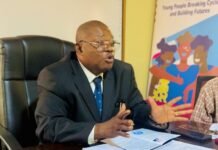By Foday Moriba Conteh
The Global Youth Counterpart for Sustainable Development (GYC), a youth-led Non-Governmental Organization operating in Sierra Leone, has embarked on a significant tree-planting initiative in collaboration with the World Bank’s NaCSA Productive Social Safety Network and Youth Employment (PSSNYE) Project, specifically under Component 2B – Public Green Work (PGW).
With the goal of addressing critical environmental and climate challenges, GYC has on 1st October, 2023 commenced the planting of 250,000 trees across thirteen catchments areas in partnership with the Freetown City Council (FCC) and Community-Based Organizations (CBOs). This ambitious endeavour aims to mitigate the adverse impacts of rapid urbanization, deforestation and climate change in Sierra Leone.
Speaking to this medium, the Executive Director of Global Youth Counterpart for Sustainable Development (GYC), Abdul Karim Marah, said the country’s urban population has been rapidly increasing, particularly in Freetown, where urban expansion is encroaching into forested areas, adding that this uncontrolled growth has resulted in deforestation and habitat loss, posing threats such as landslides, floods, and sea-level rise of which the loss of forested areas is also affecting water reserves, which provide a critical water supply to Freetown.
He said that as part of the 250,000 trees to be planted across thirteen catchments areas within the Western Rural and Urban, they have already planted 150, 000 trees in different communities which include Mongeabga, Moyieba, Gloucester, Jui, Madina, Leicester Communities etc. and Fourah Bay College Campus.
Abdul Karim Marah revealed that after the 2017 mudslide in the country, the World Bank conducted a Multi-City Hazard Review and Assessment Report furthering how, in Sierra Leone, the thirteen catchment areas selected for the project are part of those identified as extremely prone disaster areas.
The Executive Director also disclosed how the GYC’s tree-planting approach utilizes a sustainable model that actively engages local citizens and community-based growers, stating that the approach not only promotes the planting of trees but also ensures their long-term survival.
He stated that they do not only plant and grow the trees but also digitally track as well as maintenance, using the Tree Tracker app, which is used on locally available smartphones saying it enables growers to geotag and monitor each newly planted tree.
Abdul Karim furthered that growers revisit seedlings to maintain and document their growth, with mobile money micropayments offered for their efforts and that the community-driven model is designed to achieve an 80% tree-survival rate while enhancing community ownership of the project.
The Executive Director also pointed out that additionally, the initiative incorporates various types of trees, including upper catchment and forest trees, economic trees, native trees, and mangrove trees.
According to him, the tree-planting effort serves to enhance environmental restoration, promote climate resilience, and alleviate the short-term economic and poverty impacts of COVID-19 on vulnerable households while creating long and short term job opportunities for 220, particularly for youth, women, migrants and other vulnerable groups and that the project is supported by a range of open-source applications and verification systems to ensure transparency and long-term success.
He concluded by saying that the GYC’s comprehensive and community-focused approach underscores its commitment to addressing environmental challenges, fostering sustainability and promoting economic empowerment in Sierra Leone.




